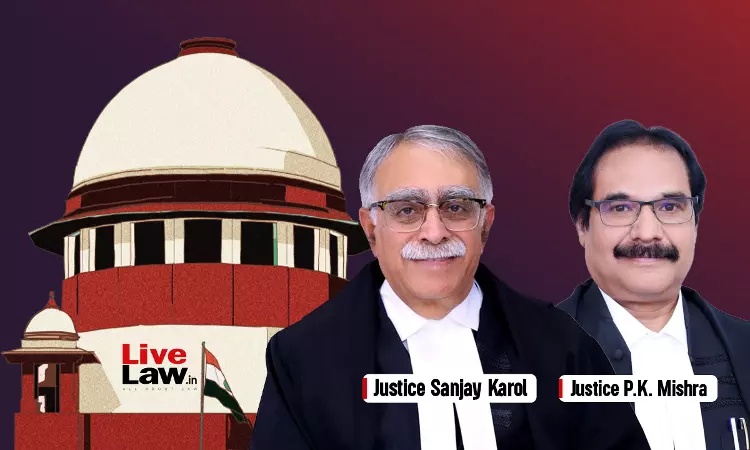- Home
- /
- Supreme court
- /
- Refusal To Enter Witness Box By...
Refusal To Enter Witness Box By Party Having Special Knowledge Of Facts Invites Adverse Inference : Supreme Court
Yash Mittal
26 Aug 2025 11:41 AM IST
The Supreme Court on Monday (Aug. 25) observed that when certain facts lie exclusively within a party's personal knowledge, the failure to enter the witness box to testify on those facts can lead to serious consequences for that party. “In civil proceedings, particularly where the facts lie exclusively within the personal knowledge of the party, the refusal to enter the witness box...
The Supreme Court on Monday (Aug. 25) observed that when certain facts lie exclusively within a party's personal knowledge, the failure to enter the witness box to testify on those facts can lead to serious consequences for that party.
“In civil proceedings, particularly where the facts lie exclusively within the personal knowledge of the party, the refusal to enter the witness box carries grave evidentiary consequences.”, the court said.
The bench comprising Justices Sanjay Karol and Prashant Kumar Mishra heard the case where the dispute was regarding ascertaining the validity of the first marriage of the plaintiff's mother with one Dasabovi to claim inheritance rights in ancestral property. The Plaintiffs contended that they were entitled to the right in ancestral property as their mother was a legally wedded wife of deceased Dasabovi. However, the defendant no.1-second wife denied the same, stating that she was the only wife of the deceased Dasabovi, hence plaintiffs entitlements towards ancestral property cannot be sustained.
In support of their mother's marriage with Dasabovi, the plaintiff's invoked Section 50 of the Evidence Act, to produce a witness-PW 2 who had “special means of knowledge on the subject” i.e., the factum of marriage between the Dasabovi and plaintiff's mother. However, the second wife failed to rebut this presumption, leading to an adverse inference. She only relied on revenue records showing her name along with Dasavobi's name, arguing that the property stands in their name, hence the plaintiffs cannot claim ancestral rights.
Affirming the High Court's decision that the plaintiffs were legitimate heirs and were entitled to partition and a share of the property, the judgment authored by Justice Mishra observed:
“The failure of the defendants to substantiate their claims through documentary evidence is eclipsed by a more consequential omission. In a case where the principal controversy turns on matters lying within her exclusive personal knowledge, the silence of defendant No.1, her absence from the witness box, is not a procedural lapse but a calculated withdrawal from scrutiny.”
“The conspicuous silence of defendant no.1 strikes not merely as omission but as deliberate evasion. Defendant No. 1, who lies at the heart of the controversy, chose not to step into the witness box and depose regarding the relationship between the plaintiffs' mother and her husband. Her testimony bore direct relevance not only to the status of plaintiffs' mother but also her own position.”, the court added.
Reference was made to the case of Vidhyadhar v. Manikrao and Anr. (1999), which observed that “where a party to the suit does not appear in the witnessbox and states his own case on oath and does not offer himself to be cross-examined by the other side, a presumption would arise that the case set up by him is not correct…”. Applying the same, the Court held that the application of an adverse presumption under Section 114(g) of the Evidence Act against her was inevitable.
“A Court of law cannot offer refuge to studied silence where a duty to disclose exists. The plaintiffs anchored their claim in measured and unwavering testimony of P.W.2 (Hanumanthappa), an account rooted in personal knowledge and long-standing familiarity, which withstood the rigours of cross-examination. His evidence, unshaken and consistent, found further corroboration in the genealogical chart presented by the plaintiffs. It, therefore, stands established that the plaintiffs have discharged the evidentiary burden imposed upon them by law. In contrast, the defendants, bereft of probative material or candour, resorted solely to denials. When measured against the touchstone of preponderance of probabilities, the scales unambiguously tilt in favour of the plaintiffs.”, the court held.
Accordingly, the appeal being devoid of merit was dismissed.
Cause Title: Chowdamma (D) by LR and Another Versus Venkatappa (D) by LRs and Another
Citation : 2025 LiveLaw (SC) 838
Click here to read/download the judgment
Appearance:
For Appellant(s) : Ms. Kiran Suri, Sr. Adv. Mr. S.J. Amith, Adv. Ms. Aishwarya Kumar, Adv. Dr. Mrs. Vipin Gupta, AOR
For Respondent(s) :Mr. G V Chandrashekar, Sr. Adv. Mr. N K Verma, Adv. Ms. Apeksha D, Adv. Ms. Anjana Chandrashekar, AOR



